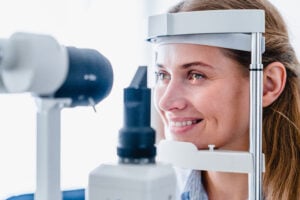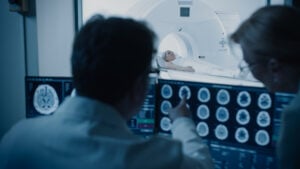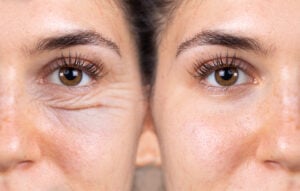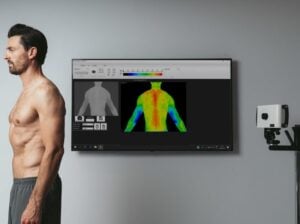Medical professionals and researchers using Artificial Intelligence (AI) can now monitor an individual’s heart health by looking into their eyes.
This groundbreaking discovery offers the potential for faster heart disease diagnoses for those in developed countries and better health checks for poorer nations where the cost of cardiac imaging and scanning equipment can prove prohibitive.
A detailed scan of the retina and its tiny blood vessels is taken using routine retinal imaging equipment. Changes in these blood vessels can indicate vascular disease, negatively affecting the heart. The scan is then analysed using artificial intelligence to assess the probability of imminent cardiac problems. The technology is powerful enough to identify individuals who are likely to have a heart attack within the following year.
The recently published research ‘Predicting myocardial infarction through retinal scans and minimal personal information’ was carried out in the UK. This is big news for medicine and cardiology worldwide as cardiovascular disease is the second biggest cause of death in the UK and the leading cause of death worldwide.
Ground-breaking research is 80 per cent accurate
The artificial intelligence system, developed by researchers at Leeds University in England, is claimed to be up to 80 per cent accurate in diagnosing potential heart attacks. It works using algorithms to pinpoint data patterns. From these patterns, medical staff can evaluate future health implications.
The individual in charge of the research is Professor Alex Frangi. He holds the Diamond Jubilee Chair in Computational Medicine and is also a Fellow at the Alan Turing Institute. He is extremely excited about the retina screening system’s possibilities for detecting early cardiac problems.
This technique opens up the possibility of revolutionizing the screening of cardiac disease. Retinal scans are comparatively cheap and routinely used in many optician’s practices. As a result of automated screening, patients who are at high risk of becoming ill could be referred to specialist cardiac services. The scans could also be used to track the early signs of heart disease.
Professor Alex Frangi, Diamond Jubilee Chair in Computational Medicine at the University of Leeds
Chris Gale, Professor of Cardiovascular Medicine at the University of Leeds and a Consultant Cardiologist at Leeds Teaching Hospitals NHS Trust, was also heavily involved in the research.
He said: “The AI system has the potential to identify individuals attending routine eye screening… treatments could be started earlier to prevent the development of further cardiovascular damage.”
How the Artificial Intelligence works
The AI system analysed the retinal scans together with cardiac scans of 5000 people, allowing it to make links between the retinal pathology and heart changes.
By studying the retinal scans, the AI system provided information on the heart’s left ventricle, including its size and how well it pumped blood. The more enlarged the left ventricle, the more likely it is that the patient will suffer from heart disease.
Information on the size of a patient’s left ventricle and how well (or not) it works can only be determined via sophisticated and expensive imaging technologies such as echocardiography or magnetic resonance imaging. This information was fed into a system looking at basic demographic information on the patient, such as their age and sex, allowing the machine to assess the probability that the individual was at risk of a heart attack over the next year.
The AI system is an excellent tool for unravelling the complex patterns that exist in nature, and that is what we have found here – the intricate pattern of changes in the retina linked to changes in the heart.
Sven Plein, British Heart Foundation Professor of Cardiovascular Imaging at the University of Leeds
Although the research was led by Leeds University and the Leeds Teaching Hospitals NHS Trust, there were other international contributions. Institutions involved included the Cixi Institute of Biomedical Imaging in Ningbo, the Chinese Academy of Sciences, KU Leuven in Belgium and the University of Cote d’Azur in France. The United States was represented by the National Centre for Biotechnology Information and the National Eye Institute and the UK Biobank provided data.
Don’t miss your next eye exam
What this means is that if you have ever considered skipping a scheduled eye scan because you feel your sight hasn’t changed in recent years, then don’t. A visit to your local ophthalmologist and optometrist means so much more today than whether or not you’re becoming a little short-sighted. In fact, it could save your life.
Medical Travel Market is soon launching agency services to connect patients with the world’s most advanced hospitals treating heart disease. Sign up to stay informed.













